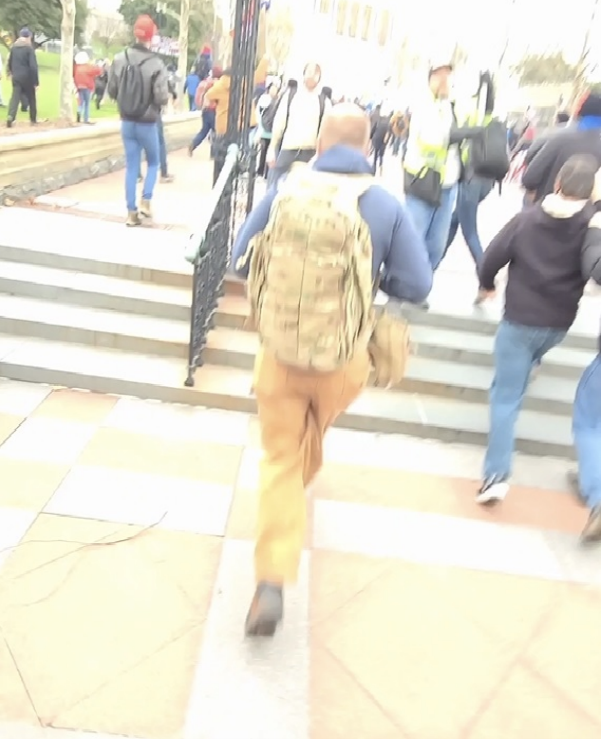Three Tea Leaves in Judge Tim Kelly’s Matthew Greene Detention Decision
Judge Tim Kelly, the judge presiding over most of the Proud Boy cases, just ruled that Matthew Greene must remain detained until his trial as a threat to the community. Greene’s defense attorney Michael Kasmarek made a compelling argument that the things Greene did at the Capitol weren’t as bad as some other defendants and a witness who testified that Greene had suggested they would have killed Nancy Pelosi if they had found her is unreliable (here is his brief). Prosecutor Erik Kenerson argued that the things Greene did since January 6 — such as stocking up on ammunition and calling for war — were the things that merited detention (here’s the government brief).
It didn’t help Greene that since these filings New York State indicted him because some of the guns he possessed when the FBI showed up were not legal in NY.
But I found the hearing most interesting for how Kelly got to the decision and something he said along the way.
First, after Kenerson said that two of the defendants were at least considering pleading, Kelly said he didn’t think he’d rule on the co-defendant William Pepe’s pending motions — a motion to dismiss the obstruction count, a motion to sever Pepe from Greene and Dominic Pezzola, and a motion to transfer the case out of DC — until after defendants decided they were going to trial.
Given my focus on pending challenges to the obstruction count, it’s significant that Kelly would defer ruling on it. According to a list of all the pending 1512 challenges submitted to Judge Randolph Moss by Brady Knowlton, Kelly has similar challenges from Ethan Nordean (which I wrote about here) and Joshua Pruitt.
But two other comments Kelly made suggest it may not matter.
As he began his analysis of the detention decision for Greene, he noted that the obstruction charge he and the others face may carry a sentence of up to 20 years; he characterized the charged crime as the obstruction of the peaceful transfer of power and described it as a gravely serious crime.
That doesn’t sound like the language of a judge who finds the obstruction charge inapt.
And then from that discussion Kelly described how the damage to the window of the Capitol he is charged with as a co-conspirator of Pezzola carries a terrorism enhancement.
It does — I’ve written about it several times, and such allegations have been before Kelly since a detention dispute for Pezzola in February. But I don’t remember Kelly emphasizing it as much in the past.
To be very clear: Kelly was talking about these legal implications in terms of what the grand jury had decided to charge these Proud Boys with. He wasn’t judging that the Proud Boys are terrorists; rather, he is noting that the grand jury charged them in such a way to be treated as such.
Still, it reflected a thought process I don’t recall him expressing in the same way before. And that’s of particular interest, because Kelly ruled Greene should stay in jail almost entirely because of the risk he — and the Proud Boys — posed going forward.




Very interesting discernments (and of grave importance). How does this work in this mass of cases w/lots of juggle balls in the air — for example, if Judge Mehta rules first on the 1512 issue in Caldwell, would other judges like Kelly perhaps (dis)agree/refine/be beholden (to extent of common facts/ arguments/ should defendants cherry-pick from other decisions)? How does that work here with the near-simultaneity, the novelty, the different conspiracy clusters/defs.?
I’m wondering how judges’ rulings in different, but related cases impact things in the immediate term (and if there’s a reason for one judge to wish another to go first/ordinate issues, or if a judge would only pause because of what’s going on with their own cases) but also how to ascertain when the matter would be settled-ish enough to proceed (well, besides should anyone plead, or appeals on the other end) or for us to have confidence that the main outlines of how this adaptable conspiracy has thus far been charged isn’t collapsed.
Are the other judges in their own rulings only beholden to decisions of same-circuit peers to the extent they’re adopted after a superior court weighs in?
Are we waiting on all or just some key of the objections to be resolved before feeling any confidence in the core obstruction charge (and thus perhaps its applicability to higher-ups in the conspiracy)?
[I’m both tired and imagining a byzantine spiral of case-by-case rulings/appeals before trial/plea where one defendant at a different stage admixes arguments from other cases and multiplying this x both current and potential future comers.] [And that’s before we get to whatever P
owellierce is up to.]I’ve wondered about some of this as well. Given the interconnectedness of these cases, do the judges have the option to discuss things with each other? I mean, how best to proceed, etc. not necessarily the specifics of the cases.
Does this have any implications for broader conspiracy cases? I assume the obstruction issue would matter if the government wants to charge people who weren’t in the Capitol on 1/6 but organized the effort to obsruct, but I don’t know if there is enough of a case based on the violence and break ins alone to make the obstruction issue less important for outside conspirators.
Are there any misdemeanor defendants who have social media evidence both:
pre-attack claiming they’re “Going to ‘something something’ the Capitol.” AND
post-attack claiming “We just stormed/took the F’ing Capitol.”?